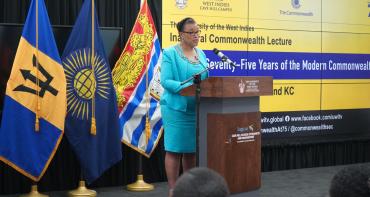In a matter of hours, 1000 athletes and officials will be at the Thomas A Robinson Stadium, in the Queen Elizabeth Sports Centre in The Bahamian capital Nassau, to witness a once in a life-time event.

In a matter of hours, 1000 athletes and officials will be at the Thomas A Robinson Stadium, in the Queen Elizabeth Sports Centre in The Bahamian capital Nassau, to witness a once in a life-time event. Not since 1966, when Jamaica hosted the Commonwealth Games in Kingston, has the Caribbean witnessed such a sporting event.
The Commonwealth Youth Games 2017, in The Bahamas, is something special. Remember that this small island state stepped in at the last moment to stage a spectacle aimed at 14 to 19 year olds. And what a magnificent job The Bahamas has done in the past 21 months, giving many their first taste of international competition.
Said Commonwealth Secretary-General Patricia Scotland, “It is a huge privilege to be here. The Commonwealth is 2.4 billion large and 60 percent of them is under the age of 30, so these Youth Games for 14 to 19 year-olds are brilliant because they bring together the brightest and the best from our Commonwealth nations in one place. I can’t think of anywhere more beautiful or more wonderful than right here in The Bahamas.”
And it is the ‘brightest and the best’ who will take part in the Games which are an exemplar of the valuable role sport plays engaging and developing young people in communities across the Commonwealth.
“If you think about the discipline, the dedication, the commitment it takes to hone your sport and the fact that many of these sports are dealt with in teams, so they are life-skills. We have noticed that a number of people who were sports men and women in their youth go on to become leaders.
“You’ll see them as prime ministers, heads of industry, heads of churches, heads of civil society groups, people who understand commitment, who understand community and sport itself as a great opportunity to heal and bring peace different nations.”
It is a point echoed by the minister for youth, sport and culture in The Bahamas, Michael Pintard, who took part in the Commonwealth youth programme.
“Sport is an incredible equaliser,” he said. “It really demonstrates that social class, ethnicity, political and religious differences are secondary to people using their God-given talents and excelling. One of the critical things it does is to help people develop healthy life-styles and a core section of values that are useful for you, not just in the competitive discipline that you’re part of but useful for you generally.
“In a global village, many economies are struggling. Sport is providing a vehicle that’s transporting people out of poverty into affluence, where they can, in turn, benefit whole communities because of their success in athletics or because of the education they have gained as a result of sport allowing them to come back home and impart it to their communities.”
The minister's comments mirror the view of other Commonwealth leaders who have consistently endorsed the potential for sport to contribute to building strong communities and improving quality of life for people far beyond just elite athletes. It is why the Commonwealth Secretariat assists member countries to maximise the potential of sports to promote health and well-being, build community cohesion and advance youth development.
As part of this programme the Commonwealth Secretariat and its partners, the Commonwealth Games Federation, the Royal Commonwealth Society and UNICEF will work with athletes at the Games to develop their potential to lead positive change in their communities. Together they are delivering a series of ‘Athlete Impact Labs’. These labs will form a crucial part of The Bahamas 2017 cultural and personal development programme. They are interactive and innovative workshops which help athletes understand how sport can be used to improve people’s lives and how participants can be advocates for positive change.
“This will be an opportunity to pool what they have learnt, how they can use their role of athletes to help deliver on the sustainable development goals, how we can help each other and reinforce the good things which are so inherent in our Commonwealth,” said Secretary-General Scotland. “The labs are an example of how the Commonwealth is working to use sport for development and sport for peace, so I think The Bahamas is going to kick it out of the park.”
One lesson the Games reinforce is the importance of investing in the leadership qualities of young people. This lesson will be highlighted again in a fortnight when the 9th Commonwealth Youth Ministers Meeting takes place in Uganda. The theme is resourcing and financing youth development, something which will be highly relevant throughout these Games.



